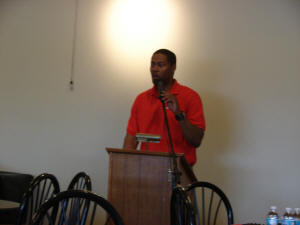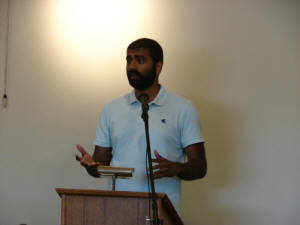|
 Brady
brings consumer experts to aid Logan County seniors Brady
brings consumer experts to aid Logan County seniors
 Send a link to a friend
Send a link to a friend
[July 11, 2014]
LINCOLN
- Illinois State Senator Bill Brady welcomed attendees at his
consumer clinic at the Oasis Senior Center on Wednesday afternoon.
Senator Brady represents several central Illinois counties including
all of Logan County in the Illinois legislature. Representatives
from the Illinois Attorney General, American Association of Retired
Persons, and the Citizens Utility Board (CUB) were on hand to answer
questions from the audience about consumer fraud, and how to save on
utility bills.
|
 Representatives of CUB sat down with individuals after their
presentation and went over their phone, electric, and gas bills
seeking to find those areas where consumers could save money. Representatives of CUB sat down with individuals after their
presentation and went over their phone, electric, and gas bills
seeking to find those areas where consumers could save money.
Caitlyn Smith from the Illinois Attorney General’s office discussed
the services that the AG offers to Illinois residents who may
suspect that they have been the target of fraud. She said, “The
Attorney General handles 30,000 complaints a year, and we address
every one of them.” These can range from complaints about home
repairs, faulty or misrepresented products, or schemes to get
consumers to invest in non-existent companies. Generally, fraud is
defined as giving money to a business for a promised service or
product and receiving nothing in return.

While the AG will request that a consumer fill out a form to file
an official complaint, the office also maintains a consumer fraud
hotline. The staff at the hotline can advise a person how to proceed
with their complaint. In many instances, the Attorney General can
act as a third party mediator to bring a resolution to a consumer
complaint by negotiating between the consumer and business.

One of the growing areas in which the AG is involved is fraud
against senior citizens. “The reason that fraud against senior is
ramping up is that criminals know that seniors have worked their
whole life and usually have built up financial resources and have
good credit,” said Smith.
Smith advises that when a person receives a phone call from an
unknown source requesting money to just hang up.
One of the recurring scams that seniors are subjected to is the
grandparent scam. Someone may call and say that a grandchild is in
trouble and needs money. “Sometimes the caller may even impersonate
a grandchild and beg to be bailed out of a bad situation,” Smith
said. She told of one senior who sent $15,000 to a scammer to
supposedly help a grandchild.
Because seniors usually have such good credit, they are able to
readily access cash at their bank. Smith advised that the person
receiving the call establish where the person is calling from and
the institution they represent. A red flag should be raised if the
supposed grandchild begs that the call be kept a secret from their
parents.
The caller may say they are calling from a jail or hospital and
readily give a phone number. If the grandparent calls to confirm
where it is coming from, the criminal will answer with the phony
name.
Smith pointed out that a person should be very careful with this
tactic. Phone numbers given by the caller are not a safe way to
confirm the origin of the call.
This can be especially with utility fraud, Smith said. She
recommends that all of the phone numbers of a person’s utility
providers and credit card companies should be kept on a list next to
the phone. This is an easy way to determine if the number given by
the caller is legitimate.
Smith especially emphasized that no personal information should be
given to a caller representing their bank, credit card company, or
utility without confirming the source of the call.

[to top of second
column] |
 Identity theft is a growing problem. Care should also be taken
when using the internet as well as unwelcome phone calls.
A social security number should never be given to a caller who is
trying to represent a person’s bank or credit card company.
This even goes for someone only requesting the last four digits of a
SSN. The first three numbers of a SSN indicate where a person was
born, the middle two when a person first applied for a SSN, but the
last four numbers are a unique number that are only given to one
person. Caitlyn Smith said that it has been the case that a scammer
can guess at the first five numbers and maybe get them right, and
then get the final four numbers given unwittingly by a person who
thinks that they can’t be used to get the complete number.

Andre Jordan, Associate Director of the Illinois branch of the
American Association of Retired Persons spoke about the work the
AARP is doing to protect aging consumers. AARP stresses consumer
protection and financial security, and acts as an advocate for
seniors in Congress.
Jordan spoke of the work AARP is doing to educate seniors about the
many scams that are aimed at them. Jordan recommends that before
agreeing to sign a contract for service from an unknown company, the
consumer check with the Attorney General, Secretary of State, and
Better Business Bureau. The best idea is to use a local company that
is known to the consumer in order to avoid a scam. He especially
warned the audience about scams on the phone and internet involving
summer travel, which are numerous this time of year.


Rajiv Ravulapati spoke on behalf of the Citizens Utility Board.
CUB was founded in 1984 in Illinois by legislative act. Its job is
to help regulate and oversee the utilities that operate in the
state. CUB is based in Chicago, but has recently opened an office in
Hillsboro to better serve central and southern Illinois. The goal is
to help consumers understand and manage their utility bills, and to
fight against the ongoing attempt of utilities to raise their fees.
After the three presentations, several CUB representatives sat down
with individuals and reviewed their utility bills to see if they
could be reduced.
The Illinois Attorney General’s Consumer Fraud Hotline is
1-800-386-5438 (TTY: 1-800-964-3013). The Senior Fraud Hotline is
1-800-243-5377 (TTY: 1-800-964-3013).
The Citizens Utility Board can be reached at 1-800-669-5556 and
www.CitizensUtilityBoard.org
The American Association of Retired Persons website is
www.AARP.org
[By CURT FOX] |